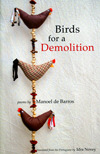Birds for a Demolition
The ninety-two-year old de Barros, recipient of the most prestigious poetry awards in his native Brazil, is author of more than 20 books, though this is the first to appear in English. (Birds for Demolition is a collection of poems from the poet’s oeuvre over the last few decades.) Novey, director of Columbia University’s Center for Literary Translation and author of the poetry collection, The Next Country (2008), explains in her introductory note that de Barros writes of the wetlands and rivers, the “poverty and solitude of rural life,” the part of Brazil where he was raised and which he knows best, not the city, where we often expect (however erroneously) to find most poets. She classifies his writing as “riverbed-poems” and describes the intensity of the experience of translating their unique sense of place.
The ninety-two-year old de Barros, recipient of the most prestigious poetry awards in his native Brazil, is author of more than 20 books, though this is the first to appear in English. (Birds for Demolition is a collection of poems from the poet’s oeuvre over the last few decades.) Novey, director of Columbia University’s Center for Literary Translation and author of the poetry collection, The Next Country (2008), explains in her introductory note that de Barros writes of the wetlands and rivers, the “poverty and solitude of rural life,” the part of Brazil where he was raised and which he knows best, not the city, where we often expect (however erroneously) to find most poets. She classifies his writing as “riverbed-poems” and describes the intensity of the experience of translating their unique sense of place.
The poems are fluid and the translations pleasing and effortless. I wish this were a bilingual edition—even readers who do not know Portuguese would benefit from the opportunity to see the originals. Nonetheless, the distinct cultural and geographic realities of the poet’s experience are everywhere in evidence, expertly translated, from the jaguar as metaphor (a common image in Latin American literature), to local flora and fauna (lizards, palm trees, river birds, scrub grass and swamps), to the specific names of people and places. The verse is supple and natural, even when “writer-ly” with translations that appear lucid, self-assured, and comfortable.
I was impressed with the poet’s ease moving between tones, forms, and styles. I appreciated, in particular, a few of the more unconventional (though not wildly inventive) poems, such as “An Education on Invention,” one of the longer poems in the book. Here is the first of twelve segments:
To touch the intimacies of the world it’s essential to know:
a) that the splendor of a morning doesn’t open with a fork
b) how violets prepare a day for its death
c) why red-stripe butterflies are so devoted to tombstones
d) that a man who spies his existence in the campfire
will be saved
e) that a river flowing between two hyacinths
bears more tenderness than one that runs between two
lizards
f) how to assume the voice of a fish
g) which side of the night will dampen first
etc.
etc.
etc.
Unlearning eight hours a day teaches such principles.
The poem’s “education” merges the sense of local precision, philosophical insight, and emotional yearning (to be saved) that is the poet’s special strength and which is lovingly, intelligently captured by the translator.
De Barrios is at his best, too, in poems such as “Day Three,” in which he conveys whole histories in brief lines (“I’m various people undone”) and “Day Two,” where sound is paramount, yet never superfluous (“I repose in the water’s composure”). Without the original for comparison, it is impossible to know if the line’s exquisite construction in terms of sound and rhythm replicates the original or embellishes, but it is nonetheless pleasing, effective, and memorable.
While prone on occasion to grand pronouncements (“Nobody fathers a poem without dying.”), de Barros can be humble in the face of the world that confronts him and his task of interpreting it, as in this example from the prose poem “Invented Memoir”:
Later, calmer, writing to a friend, he remembered the vision: even the stones in the street had cried. It was such a beautiful sentence because there was no reason in it. He said this.
And true to the tradition, habit, and cultural exigencies of Latin American writers, de Barrios is necessarily political, as in the book’s opening poem, “Visit”:
In the cell of Pedro Norato, twenty-three years in seclusion,
death naps with its legs open…
Between the prison bars its weeds its way in.
It has the blighted sleep of thighs.
While Novey has published numerous translations of the poet’s work in journals, I am surprised that this is the first full-length collection of his work, and I am pleased that Carnegie Mellon University Press has given us a book, finally, from this fine and accomplished Brazilian poet.





